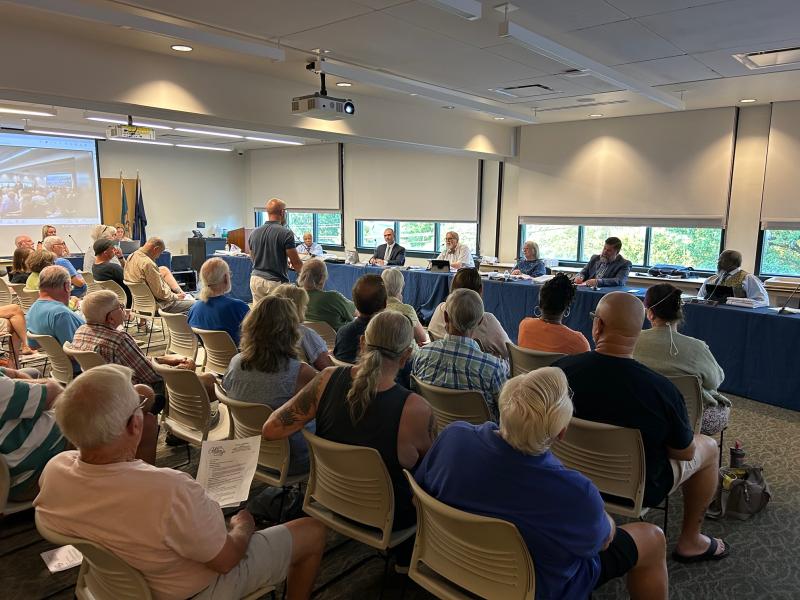It was a hot summer night outside Milton library Aug. 5, but that was nothing compared to the heat inside the library meeting room as town council took its first crack at revisions to the fiscal year 2025 budget.
Discussion of the budget came in two sections, the first was public comment early in the meeting, and then actual discussion by council later. The library meeting room was packed for the first section, but once the public made their comments, many left before council gave its feedback as the meeting pushed past the three-hour mark.
It was then, during a discussion of over avenues the town could take to decrease costs and increase revenues, when the real fireworks began.
Vice Mayor Lee Revis-Plank made a suggestion about possibly incentivizing citizens to move away from paper bills by offering a one-time payment of $1 to everyone who signs up to pay their bills online.
Mayor John Collier responded, “I’d rather give them an autographed picture of [fellow Councilman] Scotty Edler, myself, because it doesn’t cost us as much.”
Revis-Plank said, “So are you going to make fun of everything I say tonight?”
After some back-and-forth, Collier said perhaps he should leave and let Revis-Plank finish chairing the meeting. Collier then stood up, packed his bag and declared a temporary recess as he left the room.
The remaining six council members then questioned how they should move forward. Town Solicitor Seth Thompson said as vice mayor, Revis-Plank could move to end the recess and continue the discussion, which she did.
The tension in the room was in part due to the budget’s most notable item: a property tax increase of more than 30%, an 11-cent jump from $0.324 per $100 of assessed value to $0.434 per $100. Town Manager Kristy Rogers has said the rationale for the increase is to wean the town off the use of reserve funds and transfer tax revenue to balance the budget. The recommendation for a tax increase was part of a report by the town’s financial consultants, PFM Consulting, to improve the town’s long-range financial planning.
The budget has a $13,000 surplus, with $4.2 million in revenues – $2.5 million of which comes from the tax increase – and $3.8 million in expenditures. However, $350,000 of that revenue is restricted in its use, and is subtracted from the overall surplus.
Councilman Tom Arkinson said of the budget, “Looking at this, and looking at the expenses and the revenues, I don’t think we have a spending problem. I think we have a revenue problem. We need to find revenue.”
Rogers said that another reason for the tax increase is because for many years, council decided not to increase taxes, and the town is now in a position of catch-up. Pointing to a recently passed ordinance that ties tax increases to the Consumer Price Index to have more incremental increases in the future, Rogers said if the town had done something like that 15 years ago, it would not be in the position it is now.
The town’s biggest expense is for the police department, which makes up 49% of town expenses. Council wondered if some positions could be cut, but also agreed that the current level of policing in town is important to residents. Chief Derrick Harvey added that the department already has difficulty attracting recruits for staff positions on the force, as other jurisdictions are able to offer better financial packages.
Council did not make any changes to the proposed tax increase, as it prepares to head into a Monday, Aug. 19 public hearing. Ahead of that, council heard from the public at the Aug. 5 meeting.
Much of the sentiment from those in the room, although not all, was understanding of the need for the increase, as a way to begin planning for the future while keeping up the services that have made Milton a desirable place to live. However, those who emailed their comments to be read into the record were very much opposed to the increase. One emailer even suggested that council members who vote in favor of the increase should resign.
The public will have an additional chance to weigh in at the Aug. 19 public hearing. Following that, the town’s finance committee will undertake one more review of the budget, and then council will potentially vote on the document in September. The budget must be in place by Monday, Sept. 30, before the new fiscal year begins Tuesday, Oct. 1.




















































